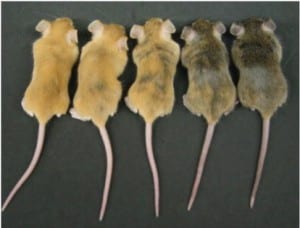How do our genes define us, and how do we define our genes?
By Freya A Boardman-Pretty, on 14 June 2012
King’s College London’s Tim Spector, as he told his audience at the Cheltenham Science Festival, used to hold the view that “everything is genetic”. Our genes are an important and complex part of determining who we are – our appearance, behaviour and susceptibility to disease.
We know, too, that our day-to-day environment and random chance also influence how we develop: how many pairs of identical twins do you know who look and act exactly the same?
But Professor Spector has since changed his point of view. There’s a third element – epigenetics – that helps to shape the differences between identical twins, and between all of us. We’re increasingly seeing how important it may be.
Epigenetics is the mechanism by which heritable modifications to our chromosomes can switch genes on and off. These modifications don’t change the sequence of the gene itself, yet can still be passed on to our children. And the position and timing of these signals to genes are affected by what we do to our bodies.
So, effectively, our environments influence our phenotype. What’s new? What’s important is that these alterations don’t just affect the individual. Mothers given a certain diet during pregnancy have children and grandchildren who are leaner and less prone to diseases such as diabetes – an effect independent of the environment in which they grow up.
What’s the catch? This study was carried out on mice. But does the effect translate to humans? Is it true that “you are what your grandmother ate”?
It might well be: what our ancestors ate many decades ago could have a significant effect on our susceptibility to diseases. People exposed to prenatal famine during the Dutch Hunger Winter of 1944–1945 were more likely to experience life-long health impairments such as hypertension and schizophrenia, and such individuals had different patterns of epigenetic marks. The environment they were exposed to affected how their genes dealt with stresses on their body – and these effects can last several generations.
Such discoveries certainly challenge deterministic views that our genes, set from birth, define our destiny. And quite apart from the challenges they present for untangling genetic mechanisms, they bring up interesting new questions about personal responsibility and accountability.
Let’s go back to our rodent models. Perhaps it’s easy enough to accept that the different chemicals that constitute our diet can modify our genes, but what of more woolly concepts such as behaviour?
A study on rats found that the licking and nursing behaviour of the mother has an effect on the offspring’s epigenetic DNA methylation patterns – and as a result, their behaviour later in life. Rats who receive more of this attention as pups are less fearful later in life, and have a less severe response to stress.
The implications for the nature/nurture debate and for methods of parenting have given us at the Science Festival something to think about. Will the way we treat our children during development affect how our descendents live many years down the line? How about how we treat our own bodies? As the field of epigenetics progresses, perhaps we will start to see that we have more control then we thought.
 Close
Close


